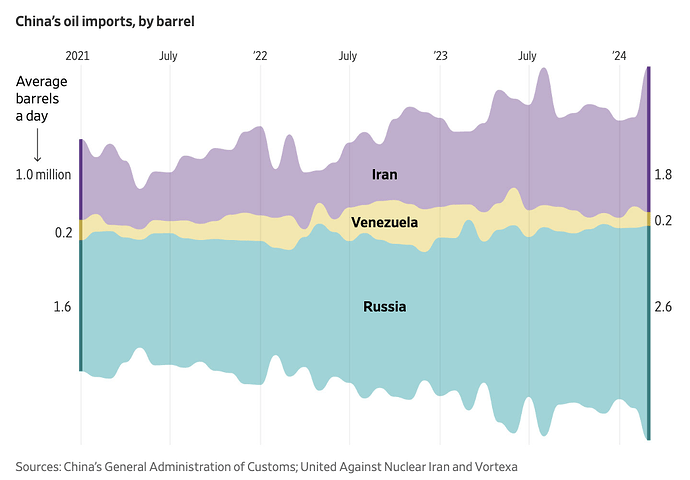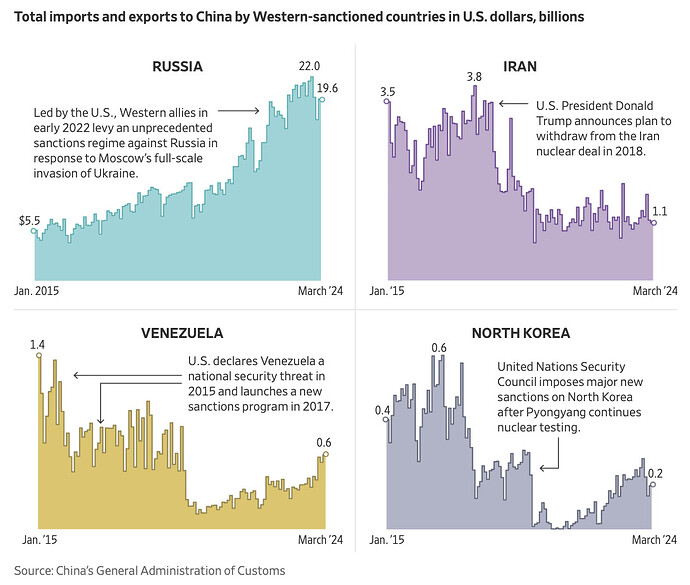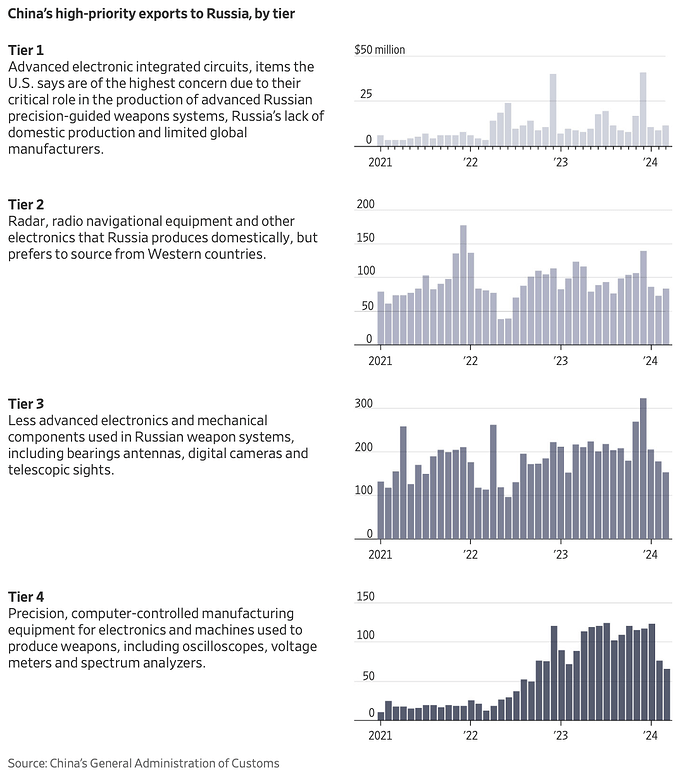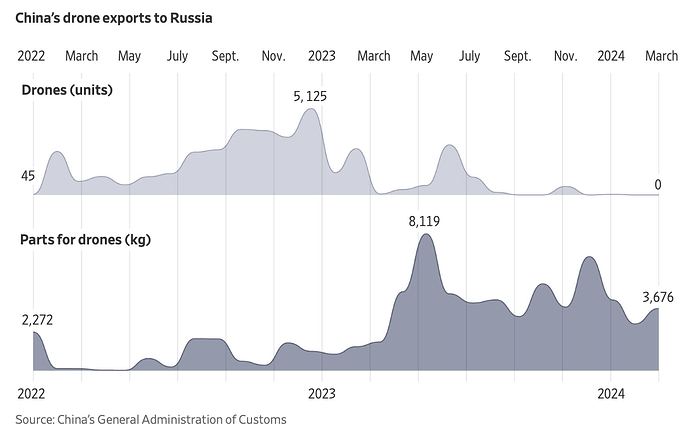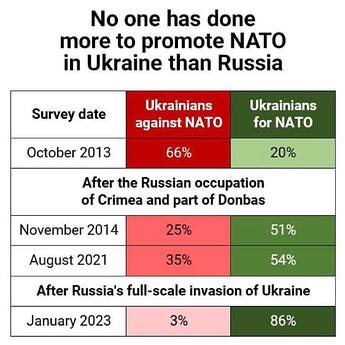Regarding a bank loan, offer a personal guarantee like Trump!
Erik Prince on the many failures of the U.S. military discusses with Tucker Carlson the revolutionary changes wrought by drone warfare’s evolution in Ukraine and its spread to disabling trade routes. This, of course, has direct implications for the power, let alone legitimacy (long ago gutted) of the US Feds.
An interesting report about China’s role and limited efficacy of sanctions:
https://www.wsj.com/world/how-america-inadvertently-created-an-axis-of-evasion-led-by-china-0a9bc477
Sanctions on a country with an advanced manufacturing capacity turn yesterday’s customers into tomorrow’s competitors.
Sanctions were always a dumb thing. It’s virtue signaling. ?Remember Michelle Obama with her little sign, “Bring our girls home” when the islamic savages in Africa abducted the hundreds of girl students. Same BS. Nothing was going to be done, BUT we had to look like we “cared”. It’s all posturing.
Sanctions used to work in Iran in 2012?
Of course in 2015 Obama shipped billions of dollars in cash to Iran to evade sanctions. Plus the reckless Iran deal which is a treaty that requires senate approval, 67 super majority
Sanctions used to work but then they didn’t. What changed?
Arguably – very arguably – the only successful use of bombing to end a war was NATO’s bombing campaign against Serbia to make that country change its borders and give up its claim to Kosovo. That NATO campaign focused on destroying civilian infrastructure – give up, or you are going back to the Stone Age.
It is difficult for us Westerners to get a clear evaluation of what is happening in the NATO proxy war in the Ukraine, with most of our media reprinting upbeat handouts from Kiev (if they report anything at all). Now we see pro-Russian websites (undoubtedly just as biased as the Western mainstream) reporting that Russia has adopted the NATO model and its attacks on Ukrainian infrastructure are reaching a critical stage.
As the Ukraine’s peak summer electricity season approaches, the list of the Russian General Staff’s Electric War targets is shrinking. This is because almost all the Ukrainian electricity generating plants have been stopped. …
… at least 86% of the country’s electricity generating capacity has now been destroyed. …
… The NATO military engineer has compiled his forecast list of Russian targets in the coming days. “We should expect the commercial fuel storage and distribution network to be hit. These are legitimate military targets as the Ukrainian military relies on them to support its war effort. The railways should be hit as well. There’s no good military reason to allow them to keep functioning. Given the NATO country endorsements for striking Russian territory targets, I don’t see the rationale on the Moscow side for leaving unscathed the rail network connecting Lvov and Kiev to Rzeszów [Poland].” …
War is misery, for civilians as well as for the grunts in the trenches. The sooner the West directs the Ukraine to start genuine negotiations, the better.
Sanctions don’t work now because we’re sanctioning too many countries, and some of those countries are major suppliers of valuable resources and commodities. So we’ve created an alternative trading bloc with lucrative opportunities for those willing to risk getting on our bad side. Russia and China are also both physically very large and share borders with quite a few countries, making laundering trade through intermediaries relatively simple.
Ukraine GDP is too small to justify NATO membership. For a relatively small price they get a security guarantee. It’s a raw deal for the wealthier members
A reasonable statement. But what about … say … Lithuania? Or Latvia? Or Estonia? Doesn’t the same objection apply to those surprisingly aggressive little countries? – the one’s baying ‘Let’s NATO and Russia fight!’
The Warsaw Pact dissolves. NATO expands by 12 nations after repeatedly stating publicly it would not do so; many new members share a border with Russia and want to get payback for historical grievances. The US wants to place ballistic missiles in Ukraine. Russia diplomatically states, repeatedly, that it considers such an existential threat. How does that add up to Russia being the “unprovoked aggressor?
To some extent, you have to relate the added defense capability to the added defense burden. GDP for the former and area or border length(or perhaps a delta in perimeter) for the latter is a rough approximation.
The bigger worry with NATO expansion has always been opsec. The former Warsaw Pact and Soviet states have nearly as many unrepentant commies and patriotic Russians as an American college campus.
Yes, the same objections apply to the Baltic nations.
Minor difference is Baltic nations have embraced and implemented free market policies that have increased GDP per capita and reduced corruption.
The biggest difference is that Russia and Putin are not worried about the small Baltic nations. Putin doesn’t consider them a threat to Russia.
To recap: NATO expansion to the Baltic states and Warsaw Pact nations was a mistake
What Putin actually considers a [physical] threat to Russia and what Putin pretextually says is a threat to Russia are two different things.
This gets into my theories of physical threats and moral threats which would involve a long discussion.
Maybe. On the other hand, the many Russian documents & statements preceding NATO’s proxy war seem consistently to imply that the big Russian concern was having NATO put missiles directly on its borders, making a NATO nuclear first strike potentially viable. Russia’s attitude to that kind of NATO threat has been rather similar to the response that a much better United States had to Soviet missiles in Cuba.
I for one would be very interested in your analysis of physical threats versus moral threats.
What missiles, what warheads?
Come on! There has been lots of NATO talk about Aegis Ashore in the Baltics.
And it is quite reasonable for a country to worry about potential future changes that could seriously undermine its security. See, for example, the great English fear in the earlier 20th Century that other countries might build up navies which could threaten the predominance of their Royal Navy.
A hostile NATO-dominated Ukraine was certainly something that Russia could quite reasonably see as a potential future threat.
I know a fellow from Latvia ![]() who has Russian derangement syndrome. Smart and knowledgeable guy but his blind spot is Russia. He was born in the 1970s.
who has Russian derangement syndrome. Smart and knowledgeable guy but his blind spot is Russia. He was born in the 1970s.
He claims that if Latvia didn’t join NATO, Russia would have invaded and attempted to annex.
I strongly disagree
For clarification, the Aegis Ashore system is an air defense system.
A Russian pretext has been that, hypothetically, the US could field a new intermediate range land attack missile with a new nuclear warhead that we could sneak into the same launchers that the Aegis Ashore uses.
We also could theoretically develop and put IRBMs in Central Europe but we have not.
